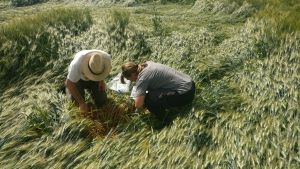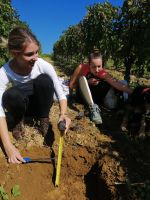- Details
The doctoral thesis of the researcher Manuel González from the UCO and the Diverfarming project demonstrates the capacity of vegetable covers for carbon sequestration from the atmosphere and for reducing greenhouse gas emissions
It has been shown that the soil is one of the greatest reservoirs of carbon in terrestrial ecosystems, since the process of CO2 sequestration contributes greatly to reducing greenhouse gases. This is the premise behind the doctoral thesis of the researcher from the Department of Agricultural Chemistry, Edaphology and Microbiology at the University of Cordoba, Spain, Manuel González Rosado, who is working within the European Diverfarming project.
- Details
Crop diversification and the reduction of chemical external inputs limit the environmental impact in agriculture by offering a possible solution to agro-climatic problems. This is the goal of the H2020 DIVERFARMING project which begins to draw its first conclusions a year and a half from the deadline.
- Details
A study within the Diverfarming project asked Finnish consumers how much they would pay for agroecosystem services and socio-cultural effects of diversification.
Many consumers are willing to pay for improved environmental quality and thus non-market values of impacts of food production on e.g. water quality, C sequestration, biodiversity, pollution, erosion or GHG emissions may even be comparable to the market value of agricultural production. Diverfarming project elucidated how consumers value agroecosystem services enabled by diversification and provided consumer perspectives for developing future agricultural and food policies to better support cropping diversification.
- Details
Presentation of case study 12 of Diverfarming project coordinated by Luke Finland
- Details
A Diverfarming team fine-tunes the methodology to measure crop growth, carbon sequestration and soil erosion in an experimental plot of ecological vineyards in Hungary
Crop diversification in vineyards may contribute to more resilient adaptation to climate change through the provision of ecosystem resources such as carbon sequestration or reducing soil erosion.














